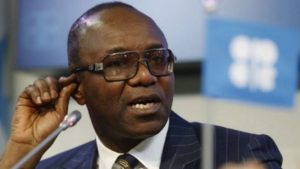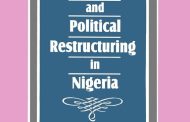Civil society organisations are calling for action in the rift which has broken out between the Minister of State for Petroleum, Dr Ibe Kachikwu and the Group Managing Director of the Nigeria National Petroleum Corporation, (NNPC). While the Socio-Economic Rights and Accountability Project, (SERAP) is asking the president to send Barau packing pending outcome of investigations, the Civil Society Legislative Advocacy Centre, (CISLAC) wants what it simply calls decisive action that would restore confidence in the Government and the fight against corruption.

Dr Ibe Kachikwu, Nigeria’s Minister of State for Petroleum and the author of a memo to the president which leaked

Dr Maikanti Baru, the GMD under fire
Procurement due process minded CISLAC says it noted with grave concern, allegations against the GMD of circumventing the procurement process in the award of a series of contracts involving as huge as $25 billion or N9 trillion (at prevailing exchange rate of N360 to a dollar). “If proven, this will amount to a major set-back in the fight against corruption and the promotion of transparency and accountability in governance which is, supposedly, the major thrust of this administration”, CISLAC said.
Standing on the same position, SERAP argues that anything to the contrary could create the impression that the government is treating Mr Baru as a sacred cow. “We urge you not to allow the allegations against Mr Baru go the way of past inconclusive investigations of allegations of massive corruption within the NNPC”, said SERAP in a statement. SERAP is further arguing the exception of this crease as far as an opportunity to reassure Nigerians worried about the direction of the anti-corruption agenda, pointing out how silence could suggest excusing certain forms of corruption under the president’s watch.”
Noting all the areas which allegations of corruption and due process failure have been made against the GMD of the NNPC by the Minister such as appointments and postings in NNPC allegedly without due process; award of contracts above $20m without following the legal and procedural requirements, particularly the Crude Term contracts- valued at over $10bn; the DSDP contracts- valued over $5bn; the AKK pipeline contract- valued at $3bn; various financing allocation funding contracts with the NOCs – value over $3bn; and various NPDC production service contracts – value at over $3bn–$4bn, Adetokunbo Mumuni of SERAP said in the statement that these breached both domestic and global best practice codes which imposed on signatories such as Nigeria very clear obligations.
CISLAC, on the other hand, wonders why the same set of allegations such cases of possible abuse of due process could have gone on without restraint under an administration that promised change and a different way of conducting government business, saying that the abuse in the award of contracts in sums exceeding the annual budget of the nation represented all-time low in a sector it said is notorious for monumental corruption. Going ahead to infer how rampant the spate of inter and intra-ministerial discord must have been under this government, concluding it indicated absence of a firm, decisive and resolute presidency which it says has undermined governance.

President Buhari: Under pressure to act
It is, therefore, calling on the President who is also the substantive Oil Minister to act decisively and resolve this rift, advising the president to, as a matter of urgency, ensure prompt and thorough investigation into the allegations and ensure that this is conclusive and pursued to its logical conclusion with consequences, where necessary.
CISLAC is, however, not all fire for the president and the GMD, it is also indicting the Minster of State for belated response that smacks of inefficiency and poor performance of his supervisory functions, allowing the figures to pile up so much before reacting and then resorting to whistle-blowing to the President even though he is the Chairman of the NNPC Board.
Extending the blame game beyond the president and the Minister of State to the National Assembly, relevant agencies and institutions, CISLAC puts it to failure in the exercise of effective supervision and oversight by the named forces, insisting on immediate inauguration of the National Council on Procurement and enactment of the Petroleum Industry Law.




























